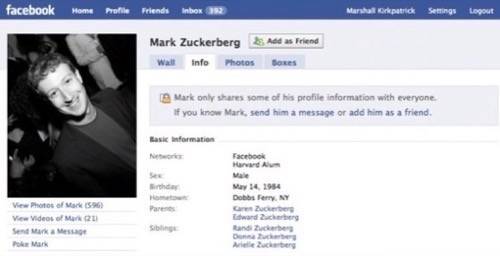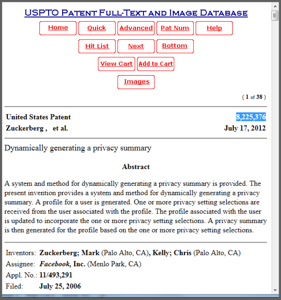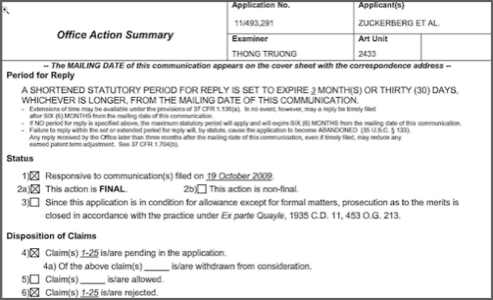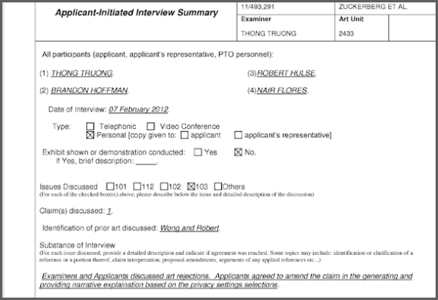
In the last few months, Facebook CEO Mark Zuckerberg took his company public, got married and scored a nearly $6 million home loan at just over 1%. What could possibly top all that? How about approval of his very first patent request from way back in 2006 – covering privacy issues no less?
Turns out the US Patent Trademark and Office (USPTO), though it originally rejected it, just granted Zuckerberg a patent that can only be described as the ultimate geek vanity trophy.
A solitary patent repeatedly originally attacked by examiners for its obviousness, this one little patent certainly won’t help Facebook defend itself in patent spats like the it was recently engaged in with Yahoo. In today’s tech patent wars, you typically need entire portfolios of offensive and defensive patents to make a difference. But at least one IP expert said Facebook needs all the patents it can get. The company is likely feeling vulnerable after the Yahoo situation.
This new patent is mostly a fancy accessory for Zuckerberg: It’s US patent 8,225,376, the first patent application he ever filed. Zuckerberg filed the application back in July 2006, the year he turned 22. He’s apparently earned at least half a dozen other patents since then, but now he’s finally seen his first application approved.
The patent, called “Dynamically Generating a Privacy Summary,” is described in its abstract as:
… a system and method for dynamically generating a privacy summary is provided. The present invention provides a system and method for dynamically generating a privacy summary. A profile for a user is generated. One or more privacy setting selections are received from the user associated with the profile. The profile associated with the user is updated to incorporate the one or more privacy setting selections. A privacy summary is then generated for the profile based on the one or more privacy setting selections
Basically, the patent – narrowed from its originally overtly “obvious” claims as recorded by patent examiners – covers a method of displaying a social network user’s profile per his or her privacy settings, display them on screen and show what their profile looks like on-screen to various other users or groups of users.

The patent is broad. The USPTO issued it only after curbing claims 1, 8 and 16, which USPTO patent examiners originally rejected because of obviousness.

According to public records, the Patent Office rejected the original, July 2006-era, Zuckerberg patent application. That didn’t stop Facebook – at least not forever. The company redoubled its efforts to get the patent through just days after it announced on February 1, 2012, that it planned to go public. The company requested and received numerous interviews with patent examiners regarding what it could do to get this patent through.

Facebook initiated an interview to re-initiate investigation of the rejected patent application on Valentine’s Day 2012, shortly after it announced its upcoming IPO. Records from the USPTO show Facebook’s enthusiastic and persistent attempts to adjust and get that first Zuckerberg patent issued. And the effort finally paid off. According to IP experts, it’s not uncommon to persist in getting a patent. If you stick it out you can get something issued.

The Zuckerberg patent is separate and distinct from the enormous patent portfolio Facebook is now in the process of assembling, in part to defend itself from patent infringement lawsuits like the one it just settled with Yahoo.
Shortly before it got involved in the Yahoo patent fracas, Facebook began buying hundreds of “just in time” defensive patents. Those efforts include purchasing hundreds of patents from AOL via Microsoft – for which it paid an estimated $1 million per patent. The USPTO patent assignee database reveals that than 500 patents (512) came to Facebook direct from AOL with the last week.
Of course this one vanity patent won’t provide the firepower of the huge portfolio of outside-invented patents Facebook is buying now. It’s really little more than a trophy – and it’s a touch ironic that it covers privacy issues, an ongoing source of controversy for Zuckerberg and Facebook. But it’s worth noting how much effort Facebook spent on acquiring what is essentially a vanity project.
Facebook did not immediately return requests for comment over the weekend.
















